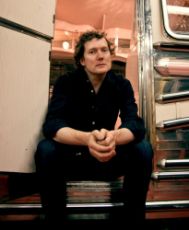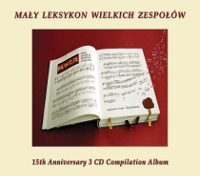 British singer-songwriter Tim Bowness, the lynchpin for the British dream pop/experimental band No-Man (whose other mastermind is Steven Wilson of Porcupine Tree fame), has left many an efficacious mark within the realm of independent music. Most readily recognized by any true prog fan as the compellingly tasteful voice of sorrowful beauty of the No-Man duo, he has lots of other musical output to offer the attentive listener.
British singer-songwriter Tim Bowness, the lynchpin for the British dream pop/experimental band No-Man (whose other mastermind is Steven Wilson of Porcupine Tree fame), has left many an efficacious mark within the realm of independent music. Most readily recognized by any true prog fan as the compellingly tasteful voice of sorrowful beauty of the No-Man duo, he has lots of other musical output to offer the attentive listener.
The recently released “Abandoned Dancehall Dreams” is only his second solo album so far. Already hailed as ‘Bowness’s masterpiece’ and ‘a contender as the triumph of 2014’ by Prog (and praised similarly by many other leading reviewers), this solo record boasts contributions from some of the progressive scene’s most lauded giants, including, but not limited to Crimsons’ Pat Mastelotto, Porcupine Tree’s Steven Wilson, Colin Edwin and Richard Barbieri and classical violinist maestro Steve Bingham.
However, the key figure behind the effort is Tim Bowness himself, whose unique musical treatment renders any material or concept his very own bittersweet and majestic taste.
Tim has kindly agreed to sit down with me to talk about Abandoned Dancehall Dreams, how solo records are born, what links ‘schoolyards’ to ‘dancehalls’, and more…
------------------------------------------------------------------------------------------------------------------------------------------------------------
Dmitry Oliderowicz: This is your first solo record since 2004’s “My Hotel Year”. However, the decade between these two dates saw you leaving your mark in a number of projects (the revived Henry Fool, Slow Electric, the live No-Man lineup, to name just a few). Why would this have to be a solo album this time round?
Tim Bowness: The songs on “Abandoned Dancehall Dreams” were originally intended to form the basis of a new No-Man album.
I’d written and co-written material over the last few years with a follow-up to “Schoolyard Ghosts” in mind. Pretty early on in the process, Steven Wilson said that he didn’t have the time to dedicate to a full No-Man album, so it accidentally evolved into my second solo album. In terms of music writing, production ideas and organisation, this is the album that I’ve contributed more to than any other, so in many ways it’s ended up as it should have done.
DO: “Abandoned Dancehall Dreams” features an impressive personnel: there’s Crimson’s Pat Mastelotto, Porcupine Tree’s Colin Edwin and Richard Barbieri, the No-Man live band musicians etc. Overall, compared to your 2004 solo record, this album is sort of more lush, expanded, bigger scale. Did you mean to make a quintessentially Bowness-que kind of musical statement, releasing it?
TB: I chose the musicians I thought could best help me realise my ideas for the songs and I was excited about working on a larger, lusher scale in the context of my solo work. I love big and bold productions as much as I do intimate, skeletal approaches to music and “Abandoned Dancehall Dreams” gave me the opportunity to do everything in the way I’d like it to be done without compromise. As such, it’s more quintessentially me than “My Hotel Year” was.
DO: Talking about the lyrics on the album, I couldn’t help noticing an interesting feature, which seems to have immigrated here from your previous work. The songs’ protagonist is always a ‘she’, and the lyrics tell about her life, her suffering and loneliness. Is this an attempt at analyzing how ‘she’ should be seeing love and everything, the female stance on the relationship, rather than the traditional masculine kind of attitude?
TB: I’ve never really thought of my writing in gender terms. I write songs about characters and experiences and as you note, quite a number are female.
Four of the new album’s pieces are written from a female perspective (“Smiler At 50”, “Smiler At 52”, “Waterfoot” and “Beaten By Love”), and the other four are written about male characters. While I was writing, I wasn’t particularly conscious of this as I was just following my instincts.
The characters in my songs are a hybrid of people I know (or have known) and imaginary scenarios. Sometimes writing the lyrics is a process of attempting to understand the characters. In some ways, I see some of my better lyrics as being short stories made song.
I write in an instinctive way and then follow those instincts to create something on a larger scale. In this case the larger scale was the overall feel of the album and tying the characters into the abandoned dancehall theme / mood.
DO: And a few words about the recording process if you don’t mind. When you record a solo album are you more of the project leader or rather the author, watching carefully over his musical offspring taking shape and being born? Do you leave space for creative freedom for the participant musicians?
TB: Both. With this album, I had a strong idea of how I wanted it to sound and I’d say that the album mostly achieved what I’d originally imagined for it. That said, I do allow people to interpret songs in the way they’d like and I sometimes take inspiration from the new approaches suggested by others.
DO: “Abandoned Dancehall Dreams” perceivably has a connection to No-Man’s “Schoolyard Ghosts” (2008) in lyrical and melancholic terms, with the ‘schoolyard’ related in some way to the ‘dancehall’, as it’s where kids go after school and might just meet their flame for the first time. Would you agree with this perception of the albums’ ‘hidden’ connection?
TB: I would agree, although it wasn’t intentional. Both albums are linked by particular overriding moods and themes. In simple terms, “Schoolyard Ghosts” deals with the aftermath of adolescence and “Abandoned Dancehall Dreams” deals with the aftermath of early adulthood, so there is a logical connection or sense of continuation.
DO: Finally, will there be a tour to promote the album? Are there going to be any of the recording personnel on the tour?
TB: We’ve already performed a few shows in the UK (four in July and August) and we’ll be playing in Holland in September. Hopefully more dates, including Poland, will come.
The current band is an odd mix of the No-Man live band, minus Steven Wilson and Steve Bingham, but plus Porcupine Tree’s Colin Edwin and Myke Clifford (from Samuel Smiles and Henry Fool).






